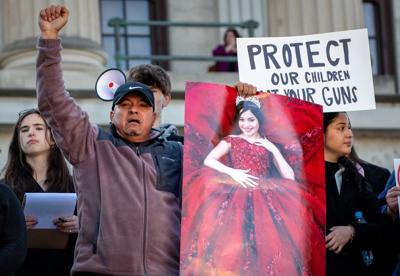Weeks into the new year, tragedy struck at Antioch High School. A 17-year-old student fired 10 shots in the school cafeteria, killing himself and a classmate and wounding another. Vigils across the city brought together students, families and community members in shared grief, particularly in the memory of 16-year-old victim Josselin Corea Escalante. Immediate law enforcement efforts traced the weapon — a 9 mm handgun — to a 2022 purchase in Arizona. They also tracked online behavior by the student, Solomon Henderson, that showed a fixation on mass killers and regular interactions with violent extremist ideology.
Two students killed, two wounded during Wednesday’s Antioch High School shooting
Metro Nashville Public Schools Director Adrienne Battle announced a plan to install metal detectors in certain MNPS schools, including Antioch High School. During the state legislative session, hundreds showed up to the Capitol to protest lax Tennessee gun laws and lawmakers’ perceived indifference to local mass shootings.
The chamber concerned itself with other matters. Immediately following the shooting, Gov. Bill Lee convened the legislature for a special session designed to marshal through an aggressive expansion of the state’s school voucher program. In the following months, debates raged on and political machinations churned, but firearm legislation took a backseat, preserving the state’s status quo.
Efforts by the Democratic minority to curtail certain aspects of firearm access failed. So did pushes by Republicans to further loosen what little state regulation exists on guns.
Corporate interests scored a major victory with House Bill 873, a bill that takes away the ability to sue a weapons manufacturer for negligence and further extends legal protections for guns and ammunition. That bill, sponsored by Rep. Monty Fritts (R-Kingston) and Sen. Joey Hensley (R-Hohenwald), stands apart from a dozen other bills that died somewhere in the Capitol’s many committees and subcommittees.
Lawmakers abandoned MaKayla’s Law on April 1. Carried by Rep. Bo Mitchell (D-Nashville) in the House and Sen. Heidi Campbell (D-Nashville) in the Senate, the legislation would have held gun owners liable for reckless endangerment should an unsecured firearm be used by a child under 13 to cause injury or death. Just those circumstances led to the shooting death of 8-year-old MaKayla Dyer of White Pine, a small town outside of Knoxville. MaKayla’s neighbor, an 11-year-old boy, shot and killed her with his father’s shotgun after MaKayla refused to let him play with her family’s puppy.
Last week’s shooting at Antioch High School reopens thorny school safety debates
Even before her election last year, first-term Rep. Shaundelle Brooks (D-Nashville) was no stranger to the state Capitol. In previous years, she saw hearings and debate from the gallery, where Brooks followed various attempts to address gun violence in the state. Davidson County voters elected Brooks in November in part for her strong bona fides advocating for better gun laws, and in one of her first moves as a legislator, Brooks carried a gun dispossession law intended to take firearms out of the hands of people convicted of domestic assault or subject to a legal order of protection. Despite an impassioned effort from Brooks, who lost her son Akilah DaSilva in the 2018 Waffle House shooting perpetrated by white supremacist Travis Reinking, the bill stalled in subcommittee.
Two Republican-backed gun bills also failed to pass muster in the Senate Judiciary Committee. The first, carried by Sen. Adam Lowe (R-Calhoun) and House Rep. Rusty Grills (R-Newbern), would have renamed handgun permits to “firearm permits” and allowed Tennesseans with such privileges to carry any firearm. The second, from Sen. Joey Hensley and Rep. Kip Capley (R-Summertown), would have lowered the legal standard for using deadly force to protect property. It also attempted to place brandishing a weapon or displaying a weapon as outside the legal definition of deadly force.
Black and red ribbons faded by two years of sun still adorn mailboxes in Nashville, a lasting memorial for the victims of the 2023 Covenant School shooting. Over the weekend, Glencliff United Methodist Church invited gun owners to surrender firearms as part of a “Guns to Gardens” project.
“Anyone may bring unwanted and unloaded guns to be dismantled and later made into garden tools, jewelry and art,” says Glencliff Pastor Ingrid McIntyre in a statement sent to the Scene. “Our group of community partners is concerned about the high level of gun violence in America and the harm that is being done through suicide, injuries, policy, accidents and other gun violence. If you feel that it is no longer safe or desirable for you to have a gun in your home, this is a responsible way to dispose of unwanted guns.”
The good, the bad and the ugly from the 2025 session of the Tennessee General Assembly








